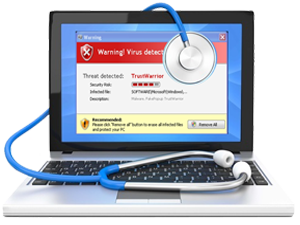Malware (malicious software) is software designed to infiltrate or damage a computer or network. Malware is commonly taken to include computer Viruses, Worms, Trojan horses, Spyware, Adware, Hijackers and Dialers. This internet garbage not only slows your computer down, it can cause operating system errors, random popups, and redirect your browser to websites without your consent. If you are infected with worms your computer can become a mass-mailing zombie. Even worse, keyloggers can grab confidential information that includes chat sessions, usernames, passwords, bank account information, full names, and even addresses that could be used to create fake online identities. Never give out personal info thru email or instant messages and beware of phishing scams.
The sad thing is that “trusted” websites can no longer be trusted. Malware was once restricted to sites offering free music or pornography , but today it’s being served up by some of the most popular sites on the web. An average of around 8,000 new URL’s containing malware emerge each day. What’s even more alarming is that 70 percent of URL’s hosting such malware are found on legitimate web sites that have been targeted by hackers. The outdated notion that malware only resides in the darker corners of the internet is far from the case now. Users are being exposed to malicious content without them being aware of it. Recently several major websites were unknowingly hosting a banner ad which was redirecting users to a site where malware was automatically downloaded. MySpace, CNN, Drudge Report, & FaceBook, have also served up malware-laced banner ads.
 Why Do People Create Computer Malware?
Why Do People Create Computer Malware?
To take control of a computer and use it for specific tasks
To generate money
To steal sensitive information (credit card numbers, passwords, personal details, data etc.)
To prove a point, to prove it can be done, to prove one’s skill or for revenge purposes
To cripple a computer or network
Tips to stop Malware
Good Real-time Anti-virus: We recommend AVG
Anti-malware scanner: We recommend Malwarebytes (free and you will need to run it)
Use ALT F4 to close fake virus alerts, popups, fake system alerts, and other suspicious windows. Hold the Alt Key and press F4 repeatedly
Run Windows Updates: Keep your operating system up to date
Don’t open Suspicious E-mails: even e-mails from someone you know could be infected
Don’t use free file sharing networks: many Movies & Songs are actually Trojan horses
Use Firefox or Chrome web browser: these browser are less susceptible to malware
Sarasota Malware removal
October 2, 2015 by admin • News •
Malware (malicious software) is software designed to infiltrate or damage a computer or network. Malware is commonly taken to include computer Viruses, Worms, Trojan horses, Spyware, Adware, Hijackers and Dialers. This internet garbage not only slows your computer down, it can cause operating system errors, random popups, and redirect your browser to websites without your consent. If you are infected with worms your computer can become a mass-mailing zombie. Even worse, keyloggers can grab confidential information that includes chat sessions, usernames, passwords, bank account information, full names, and even addresses that could be used to create fake online identities. Never give out personal info thru email or instant messages and beware of phishing scams.
The sad thing is that “trusted” websites can no longer be trusted. Malware was once restricted to sites offering free music or pornography , but today it’s being served up by some of the most popular sites on the web. An average of around 8,000 new URL’s containing malware emerge each day. What’s even more alarming is that 70 percent of URL’s hosting such malware are found on legitimate web sites that have been targeted by hackers. The outdated notion that malware only resides in the darker corners of the internet is far from the case now. Users are being exposed to malicious content without them being aware of it. Recently several major websites were unknowingly hosting a banner ad which was redirecting users to a site where malware was automatically downloaded. MySpace, CNN, Drudge Report, & FaceBook, have also served up malware-laced banner ads.
To take control of a computer and use it for specific tasks
To generate money
To steal sensitive information (credit card numbers, passwords, personal details, data etc.)
To prove a point, to prove it can be done, to prove one’s skill or for revenge purposes
To cripple a computer or network
Tips to stop Malware
Good Real-time Anti-virus: We recommend AVG
Anti-malware scanner: We recommend Malwarebytes (free and you will need to run it)
Use ALT F4 to close fake virus alerts, popups, fake system alerts, and other suspicious windows. Hold the Alt Key and press F4 repeatedly
Run Windows Updates: Keep your operating system up to date
Don’t open Suspicious E-mails: even e-mails from someone you know could be infected
Don’t use free file sharing networks: many Movies & Songs are actually Trojan horses
Use Firefox or Chrome web browser: these browser are less susceptible to malware